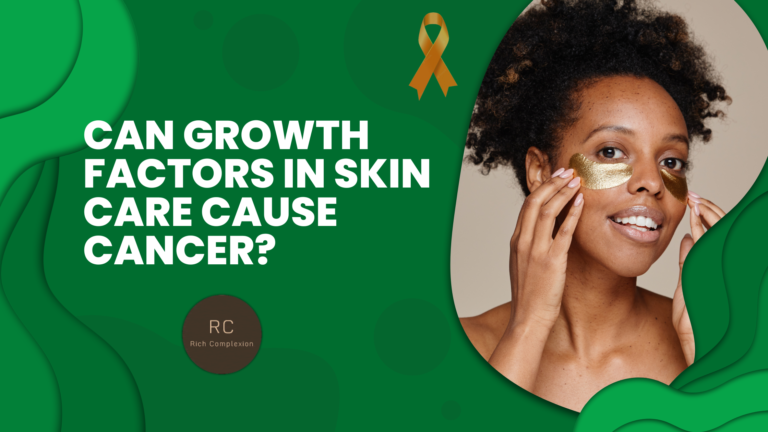For centuries, humans have searched for the fountain of youth, a mythical spring that could restore youth and vitality. In recent years, scientists have made some progress in this quest, developing skin care products that contain growth factors. These proteins are known to promote cell growth and repair, and they have been shown to improve the appearance of wrinkles, age spots, and other signs of aging.
But there is a dark side to growth factors. Some scientists worry that these proteins could also promote the growth of cancer cells. This is because growth factors can bind to receptors on both normal and cancerous cells, and they could potentially stimulate the growth of cancer cells.
So, can growth factors in skin care cause cancer? The answer is not clear. There is some evidence to suggest that growth factors could increase the risk of cancer, but more research is needed. However, in this article, we will talk about this issue so that the readers can get an idea about the growth factor in skin care and cancer. So, without further ado, let’s dive in.
Understanding The Role of Growth Factors in Skincare
Growth factors are proteins that play a vital role in the growth, repair, and regeneration of skin cells. They are naturally produced by the body, but their production declines with age. This is one of the reasons why skin tends to become thinner, less elastic, and more prone to wrinkles as we get older.
Growth factors can be applied topically to the skin in the form of creams, serums, and other products. When applied directly to the skin, growth factors can help to:
- Stimulate collagen and elastin production, which can help to reduce the appearance of wrinkles and fine lines.
- Improve skin texture and elasticity.
- Promote wound healing.
- Reduce inflammation.
- Even out skin tone.
Some of the most common growth factors used in skincare products include:
- Epidermal growth factor (EGF)
- Transforming growth factor beta (TGF-β)
- Platelet-derived growth factor (PDGF)
- Vascular endothelial growth factor (VEGF)
Growth factor creams and serums are typically more expensive than other types of skincare products, but they can offer significant benefits for people who are looking for a more youthful-looking complexion.
What Are Growth Factors & How Do They Work?
Growth factors are signaling molecules that play a crucial role in regulating various cellular processes such as cell growth, differentiation, proliferation, and survival. They are typically proteins or peptides that are secreted by cells and act on nearby cells to influence their behavior. Growth factors are essential for proper development, tissue repair, and maintenance of various physiological functions in multicellular organisms.
Here’s how growth factors work:
Cellular communication
Growth factors act as messengers that facilitate communication between cells. When a cell produces a growth factor and releases it into its surrounding environment, nearby cells equipped with the appropriate receptors can detect and respond to the growth factor.
Receptor binding
Cells that are capable of responding to a specific growth factor possess receptors on their surface or within their cytoplasm. These receptors are proteins that can bind to the growth factor with high specificity. When the growth factor binds to its receptor, it triggers a series of intracellular signaling events.
Intracellular signaling
The binding of a growth factor to its receptor initiates a signaling cascade inside the target cell. This cascade involves a series of biochemical reactions that transmit the growth factor’s message to the cell’s nucleus. The signaling pathway often involves a chain of protein interactions and modifications that ultimately lead to changes in gene expression or other cellular responses.
Cellular responses
The activation of intracellular signaling pathways by growth factors can lead to various cellular responses. These responses can include cell proliferation (increased cell division), cell differentiation (transformation into specialized cell types), cell migration (movement of cells within tissues), and cell survival (protection from apoptosis or programmed cell death).
Tissue development and repair
Growth factors are essential for processes like embryonic development, tissue regeneration, and wound healing. During these processes, growth factors guide cells to perform specific functions that are necessary for the proper formation and repair of tissues.
Homeostasis and disease
Growth factors also play a role in maintaining homeostasis (the body’s internal balance) by controlling cell turnover and tissue maintenance. Dysregulation of growth factor signaling can contribute to various diseases, including cancer, where abnormal growth factor signaling can lead to uncontrolled cell growth and tumor formation.
Examples of well-known growth factors include:
- Epidermal Growth Factor (EGF): Promotes cell growth and proliferation in the epidermis (outer layer of skin) and other tissues.
- Platelet-Derived Growth Factor (PDGF): Stimulates cell division and migration, particularly in wound healing and tissue repair.
- Vascular Endothelial Growth Factor (VEGF): Promotes the formation of new blood vessels (angiogenesis) during development and tissue repair.
- Transforming Growth Factor-beta (TGF-beta): Regulates cell growth, differentiation, and immune responses.
- Insulin-like Growth Factor (IGF): Supports cell growth, especially in bone and muscle tissues.
Overall, growth factors play a fundamental role in coordinating cellular activities and maintaining the proper functioning of tissues and organs in multicellular organisms.
The Controversy: Potential Link Between Growth Factors & Cancer
The potential link between growth factors and cancer is a topic of ongoing research and debate within the medical and scientific communities. Growth factors are proteins that play a crucial role in regulating various cellular processes, including cell growth, proliferation, differentiation, and survival. They are essential for normal development, tissue repair, and maintaining overall health.
However, abnormalities in the regulation of growth factors and their signaling pathways have been implicated in various diseases, including cancer. Cancer is characterized by uncontrolled cell growth and the ability of cells to evade normal regulatory mechanisms. Some growth factors and their associated signaling pathways can contribute to these hallmarks of cancer.
Here are some key points to consider in the controversy surrounding the potential link between growth factors and cancer.
Stimulation of cell proliferation
Growth factors can promote cell proliferation and survival by binding to specific receptors on the cell surface, initiating signaling cascades that lead to increased cell division. If these signals are dysregulated or overactive, it can lead to uncontrolled cell growth and potentially contribute to cancer development.
Angiogenesis
Growth factors also play a role in angiogenesis, the process of forming new blood vessels. Tumors require a blood supply to grow beyond a certain size, and the growth factors involved in angiogenesis can support tumor expansion by facilitating the formation of new blood vessels to supply nutrients and oxygen to the growing tumor.
Metastasis
The ability of cancer cells to invade nearby tissues and metastasize to distant parts of the body can be influenced by growth factors. Certain growth factors have the capability to trigger changes in how cells adhere to surfaces and their ability to move, thus promoting the process of metastasis.
Therapeutic targets
Because of their involvement in cancer-related processes, growth factors and their signaling pathways have been investigated as potential therapeutic targets for cancer treatment. Blocking these pathways may slow down or inhibit cancer growth.
Complexity
The relationship between growth factors and cancer is complex and context-dependent. Not all growth factors are pro-cancer. Some growth factors can have anti-tumor effects by promoting immune responses against cancer cells or inducing cell differentiation.
Research challenges
Studying the link between growth factors and cancer is challenging due to the intricate nature of cellular signaling pathways, the diversity of growth factors, and the heterogeneity of cancer types. Results from studies can vary, and more research is needed to fully understand the precise roles of different growth factors in different cancer contexts.
Clinical applications
Some cancer therapies involve targeting growth factor signaling pathways. For instance, drugs that target the epidermal growth factor receptor (EGFR) have been developed for specific cancer types.
Frequently Asked Questions (FAQs)
FAQ 1: Can growth factors in skin care products cause cancer?
Answer: As of my last knowledge update in September 2021, there is no substantial scientific evidence to support the claim that growth factors in skin care products cause cancer. Growth factors are naturally occurring proteins that play a role in cellular repair, wound healing, and maintaining healthy skin. While some studies have explored the potential effects of growth factors, the general consensus among dermatologists and researchers is that, when used in appropriate concentrations and formulations, growth factors are safe for topical application and do not pose a significant cancer risk.
FAQ 2: Are there any specific growth factors to avoid in skin care products to prevent cancer?
Answer: There is no clear evidence suggesting that specific growth factors are linked to cancer when used in skin care products. However, it’s important to choose reputable brands and products that have undergone testing and adhere to industry standards. Look for products that have been reviewed and approved by dermatologists and regulatory agencies. If you have concerns, consult a dermatologist before incorporating any new product into your skincare routine.
FAQ 3: Can growth factors promote tumor growth if applied to the skin?
Answer: The available research does not conclusively support the idea that growth factors applied topically to the skin can promote tumor growth. Growth factors are naturally produced by the body and play a role in various cellular processes, including wound healing and tissue repair. While some studies have explored potential effects in laboratory settings, the relevance of these findings to real-world applications is often uncertain. To date, there is no strong evidence indicating that topical growth factors can significantly increase the risk of tumor formation.
FAQ 4: Should individuals with a history of cancer avoid using skin care products with growth factors?
Answer: If you have a history of cancer or are undergoing cancer treatment, it’s recommended to consult with your healthcare provider before introducing any new skincare products, including those containing growth factors. Your medical history, treatment regimen, and overall health should be considered when making decisions about skincare products. Your healthcare provider can offer personalized guidance based on your individual situation.
Takeaway
In conclusion, while growth factors in skin care products have been shown to have numerous benefits for the skin, there is limited evidence suggesting a potential link between these ingredients and the development of cancer. The studies conducted thus far have produced mixed results, with some indicating a possible association and others finding no significant risk. It is important to note that the concentrations and usage of growth factors in skincare products are generally within safe limits set by regulatory authorities.
However, as with any other cosmetic ingredient, it is advisable to consult with a dermatologist or healthcare professional before incorporating growth factor-based products into your skincare routine. Ultimately, further research is needed to fully understand the long-term effects of growth factors on skin health and the potential risks they may pose.



